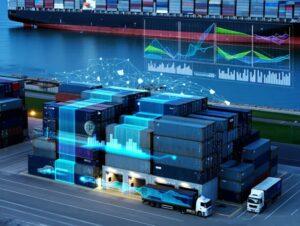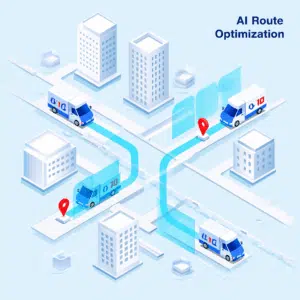The logistics and shipping industry is undergoing a major transformation, thanks to the integration of new technologies such as IoT and cloud computing. With the emergence of precise sensors and intelligent robotics, the world of shipping and supply chain management will undergo a dramatic change.
Imagine a world where every vehicle, shipping container, and shipment is linked to the internet and equipped with real-time tracking, making shipping more accurate than ever before. Exciting, right? Our experts at RTS Labs think so, and we will help you understand how IoT and cloud computing are transforming shipping analytics. So read on and discover!
What Value Can Cloud Computing Bring to the Shipping Industry?
The shipping industry is in the midst of a digital transformation, and cloud computing is at the forefront of this revolution. With the ability to quickly spin up resources, develop new applications, and experiment with innovation more frequently, cloud computing provides a level of agility that is critical in today’s fast-paced business environment.
This is especially important for an industry that is constantly evolving and requires businesses to adapt quickly to changing market conditions.
But you might wonder what the specific examples of this may be. Well, we have listed and elaborated on those, too. According to RTS Labs research, cloud computing adds value to the following aspects of supply chain management.
Reduced Expenses and Operating Costs
One of the most important driving forces behind the adoption of cloud computing is cost savings. Businesses can achieve significant savings and reduce capital expenses while taking advantage of the economies of scale that accompany cloud computing. Migrating to the cloud can contribute to global savings of millions of dollars in infrastructure costs.
Cloud Computing Offers Flexibility
If you are part of an ocean transpiration business, then you might have experienced steep fluctuations in your transactional volume. Cloud computing offers the flexibility and adaptability needed to instantly scale the business and meet the changing needs of customers. This means that you can efficiently manage your resources and avoid over-provisioning in various areas of the business, especially during non-peak times.
More Agile Innovation
Another significant advantage of cloud computing in shipping analytics is that they allow businesses to be more innovative without worrying about the technical details. This means they can focus on developing exciting new applications that improve customer experience and help them stand out from the competition.
Additionally, cloud computing allows logistics companies to respond to changes in the market quickly, which is vital in today’s highly competitive business environment. So, with cloud computing, the possibilities for innovation are endless.
What Value Can IoT Deliver to the Shipping Industry?
By incorporating IoT technology, the shipping industry can greatly benefit from improved transparency and control throughout the entire supply chain network. Some of the ways that it can bring success to the shipping business are:
Improved Monitoring and Predictive Maintenance
Logistics companies are using advanced technologies like the Internet of Things (IoT) to revolutionize the shipping industry. By adding sensors and connectivity to trucks, shipping containers, and other equipment, companies can closely monitor their location, temperature, and other important factors in real time. This makes it easier to manage their assets and cargo, reducing the risk of damage and improving overall operational efficiency.
Moreover, the benefits of IoT in shipping do not stop there. With predictive maintenance, companies can detect potential equipment issues before they become serious problems. For instance, sensors can detect when a truck’s brakes are starting to wear out and alert the company to schedule maintenance, avoiding costly breakdowns and downtime.
By using IoT technology, logistics companies can enhance safety, reduce costs, and improve their operations in countless ways.
Improved Communication and Coordination
When logistics providers and their partners can share real-time information on shipments and stock levels, they can work together more efficiently, save costs, and deliver goods faster. By using low-powered wide-area networks, IoT devices can monitor facility conditions in real-time, thus, saving time and resources.
This means that warehouses can track temperature and humidity levels and notify the concerned departments automatically if there are any changes, helping them make informed decisions about maintenance in the future.
Cold Chain Monitoring and Loss Prevention
Cold chain monitoring is a critical solution for the shipping industry that leverages IoT devices to ensure the safe transportation and storage of pharmaceutical products. For instance, vaccines require specific temperature ranges to maintain their efficacy, making it crucial to monitor and maintain the appropriate temperature levels during shipment.
IoT devices provide end-to-end visibility for customers, allowing them to track each shipment’s progress and condition throughout the journey, providing precise data and reporting for audits. IoT technology also plays a vital role in security and loss prevention in logistics and supply chains.
Shipment monitoring goes beyond simple track-and-trace and enables companies to observe a shipment’s entire journey.
With IoT devices, leveraging GPS technology and detecting temperature, humidity, light, vibrations, and more, they can provide quality control and prevent losses in shipping; which is always a priority for companies operating in the pharmaceutical and frozen food sectors.
Advantages of IoT-Based Analytics in Shipping
The shipping industry has always been at the forefront of technological innovation. However, with the emergence of IoT-based analytics, logistics companies can now optimize their operations in ways never before possible. RTS will help you take a closer look at some of the key advantages of using IoT-based analytics in shipping.
Improved Efficiency
One of the biggest benefits of IoT-based analytics in shipping is improved efficiency. By leveraging connected devices to monitor various factors such as temperature, humidity, equipment, and personnel, logistics companies can optimize their operations.
This enables them to identify inefficiencies quickly and take corrective action, leading to reduced costs and improved overall efficiency.
For example, IoT-based analytics can be used to monitor the fuel efficiency of vessels in real-time, enabling shipping companies to optimize their routes, speeds, and other factors to minimize fuel consumption and costs.
Cost Savings
Another significant advantage of IoT-based analytics in shipping is cost savings. By monitoring everything from equipment and personnel to weather conditions, logistics companies can identify inefficiencies and take corrective action, leading to reduced costs and improved profitability.
For instance, by monitoring the condition of vehicles and equipment, shipping companies can identify potential maintenance issues before they become major issues. This enables them to schedule maintenance at optimal times, reducing downtime and repair costs.
Enhanced Visibility
Finally, IoT-based analytics in shipping can provide enhanced visibility into supply chain management. By using connected devices to monitor everything from shipment locations to environmental conditions, logistics companies can track their shipments and quickly identify any delays or blockages that may arise.
An example can be how IoT-based analytics are used to monitor the temperature of cargo as it moves through the supply chain network. If the temperature falls outside of a predefined range, corrective action can be taken to ensure that the cargo remains safe and secure.
By leveraging IoT-based analytics, logistics companies can gain greater visibility into their operations, which can help them to make better-informed decisions and improve customer satisfaction.
Advantages of Cloud-Based Analytics in Shipping
Cloud-based solutions have revolutionized the shipping industry, providing a range of benefits to businesses in almost every sector. Here, we can explore a few of them.
Cost Reduction
Cloud-based technology can offer significant cost savings for businesses. With this technology, companies no longer need to invest in expensive hardware or IT infrastructure, which means they can avoid large upfront costs. In addition, cloud technology can automate routine tasks, such as resupplying inventory, which can further reduce operating costs.
This can be especially helpful for small and medium-sized businesses that do not have the resources to manage extensive hardware and IT infrastructure. With cloud-based technology, businesses can focus on their core competencies and leave the heavy lifting of managing infrastructure to their cloud service providers.
Improved Efficiency
Cloud solutions provide companies with the flexibility to automate processes and streamline workflows, leading to increased efficiency. Automated processes can be customized and configured to suit the specific needs of each business, allowing for more intelligent decision-making and freeing up time and resources for other important tasks.
Rapid Scalability and Growth
Cloud-based services enable companies to grow and scale rapidly, without the need for additional infrastructure. It provides businesses with the flexibility to reconfigure and adapt to changes in the marketplace, making it easier for them to expand their operations and meet evolving customer demands.
Consolidation of Multiple Systems
Managing shipping logistics using multiple systems can be a hassle and may cause unnecessary delays, which can hurt a business’s bottom line. Fortunately, cloud-based solutions offer a central hub to consolidate and coordinate all shipping information, eliminating the need for juggling multiple systems.
This reduces confusion and errors, leading to better communication and smoother business processes. By using a cloud-based platform, logistics companies can increase their efficiency and avoid costly mistakes, ultimately helping them to stay competitive in the market.
Real-World Examples of Cloud and IoT-Based Analytics in Shipping
DHL, Amazon, and Alibaba are some of the largest players in the global shipping industry today. These companies have been at the forefront of utilizing IoT and cloud-based analytics in their operations to optimize their supply chain operations and improve their customer experience.
DHL
DHL is a leading logistics company that offers international courier, package, and fast mail services. To improve its cargo tracking and delivery capabilities, DHL is using IoT technology, which includes sensors and GPS trackers that monitor the location and condition of their goods. This information is sent to a cloud-based system, allowing DHL to keep an eye on its shipments, improve delivery routes, and provide instant updates to its clients.
Furthermore, DHL benefits from cloud-based analytics by examining shipment and operational data for improvement opportunities. The business uses predictive analytics to foresee potential supply chain bottlenecks and improve operations accordingly.
Similarly, DHL has deployed machine learning algorithms to analyze client comments and improve the quality of the company’s customer service.
Amazon
Amazon, a global e-commerce giant, has revolutionized the shipping industry with its quick and dependable delivery services. To make its operations more efficient, Amazon has turned to IoT and cloud-based analytics. The company uses IoT sensors and devices to track its products’ movement through warehouses and delivery centers, transmitting the data to a cloud-based platform. This platform uses machine learning algorithms to optimize its inventory management and delivery routes.
Moreover, Amazon analyzes customer data using cloud-based analytics to provide personalized recommendations to its customers. By analyzing consumer behavior and purchasing patterns through machine learning algorithms, Amazon offers relevant product recommendations, enhancing the overall customer experience.
Alibaba
Alibaba is a major Chinese e-commerce company that has made a huge impact on the global shipping industry. To streamline its supply chain operations, Alibaba uses IoT devices and cloud-based technology.
By using cloud-based analytics, Alibaba is able to analyze customer data and offer personalized recommendations. To better serve its customers, the company uses machine learning algorithms to study their preferences and buying habits. To enhance transparency and security in their shipping process, Alibaba has also implemented a blockchain-based system that allows customers to track their packages in real time.

Challenges and Considerations in Implementing IoT and Cloud-Based Analytics in Shipping
When implementing IoT and cloud-based analytics in shipping, there are a number of challenges and considerations that must be taken into account. RTS Labs have documented a few common ones to help you understand them better.
- Data Breach
Data breaches can harm a shipping company by compromising sensitive information related to shipments, clients, and financial transactions. Unauthorized access can lead to reputational damage, loss of business, legal repercussions, and financial losses. This is an important consideration when migrating to cloud-based analytics.
- Integration Challenges
Incorporating these new technologies into current systems can be challenging and take a lot of time, requiring a good deal of expertise. Additionally, there is a risk of significant initial expenses and ongoing maintenance costs.
- Skills and Experience Specialization
Another challenge when it comes to using IoT and cloud-based analytics in shipping is that it requires a specific set of skills and experience. Businesses might not have employees with these skills readily available, which can make it difficult to effectively use these technologies. To overcome this problem, companies need to provide training or hire outside specialists to ensure that these systems are deployed and managed effectively.
Future Trends and Opportunities in Shipping Analytics
Although incorporating IoT and cloud-based analytics into shipping can be challenging, businesses can still reap significant benefits from these technologies. One area with great potential is machine learning, which can analyze large amounts of data and identify patterns that can be difficult for humans to detect.
Additionally, Artificial Intelligence has the ability to make shipping more autonomous, optimizing maritime transport and enabling the collection of voyage-impacting data. Finally, blockchain technology provides a secure and transparent way to track shipments and manage supply chain operations, offering an excellent opportunity for the shipping industry to reduce manual workloads, improve access to schedules, and make payments faster and more secure.
Final thoughts
Even though terms like IoT and cloud technology may seem complicated and technical, it’s important to recognize their growing importance in shipping analytics. These innovative technologies have the potential to transform how businesses handle supply chain management, logistics, and shipments today.
With their powerful capabilities for data processing, analysis, and collaboration, businesses can track and manage resources in real time. As these technologies continue to advance and improve, their impact on the shipping industry is only going to intensify.
At RTS Labs we make software that gives you an unfair advantage. Our elite cross-functional teams bring you the agility of a startup and the scalability of an industry leader.






